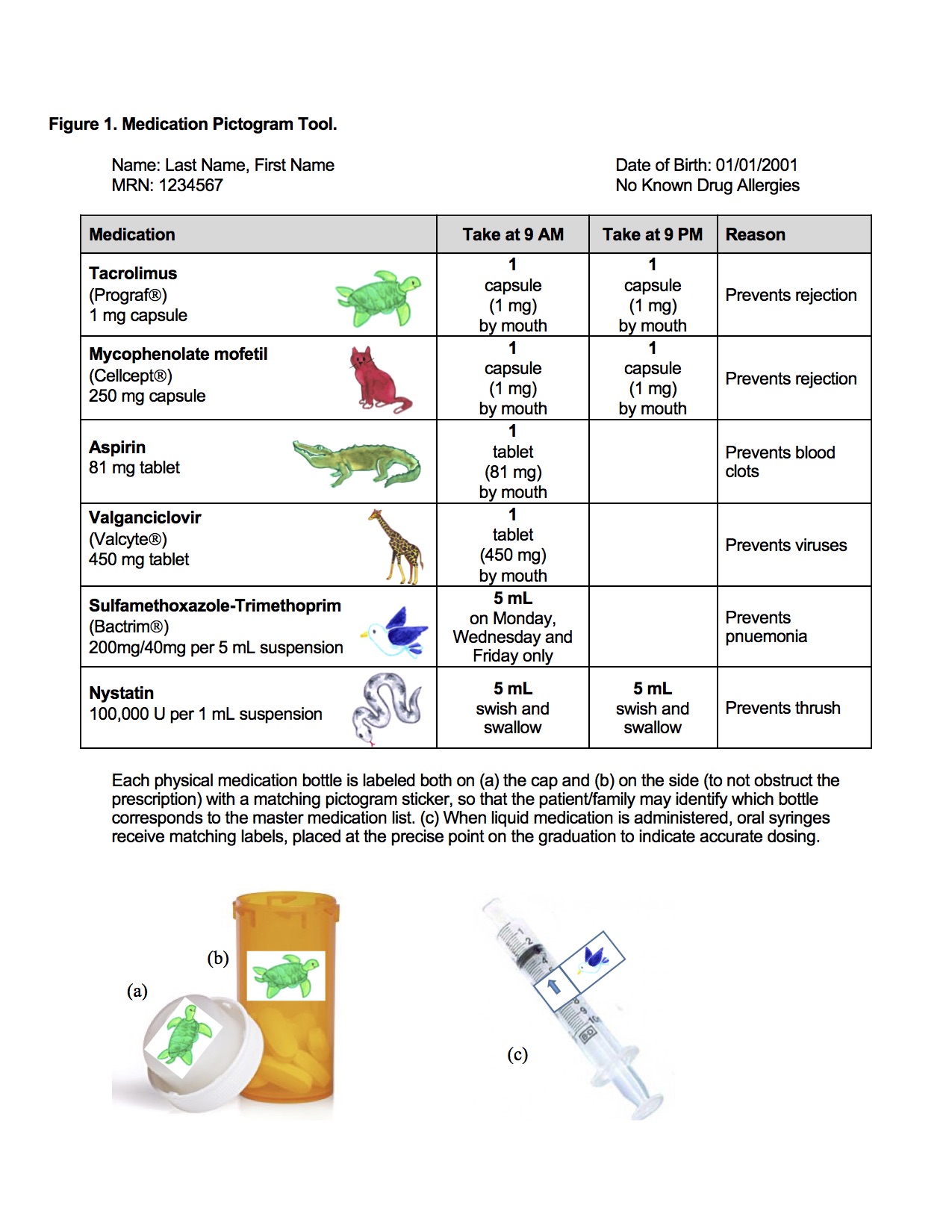Pictogram Tool to Improve Medication Adherence in Heart Transplant Families with Limited English Proficiency and Low Health Literacy
A. C. Rothkopf1, J. Chen2, N. Jasiak-Panek3, K. Le3, A. Joong4, L. J. Addonizio1
1Pediatric Cardiology, Columbia University, New York, NY, 2Department of Pharmacy, Columbia University, New York, NY, 3Department of Pharmacy, Ann & Robert H. Lurie Children's Hospital of Chicago, Chicago, IL, 4Pediatric Cardiology, Ann & Robert H. Lurie Children's Hospital of Chicago, Chicago, IL
Meeting: 2019 American Transplant Congress
Abstract number: D300
Keywords: Heart transplant patients, Outpatients, Patient education, Pediatric
Session Information
Session Name: Poster Session D: Psychosocial and Treatment Adherence
Session Type: Poster Session
Date: Tuesday, June 4, 2019
Session Time: 6:00pm-7:00pm
 Presentation Time: 6:00pm-7:00pm
Presentation Time: 6:00pm-7:00pm
Location: Hall C & D
*Purpose: Rejection in heart transplant recipients significantly limits long-term survival, impairs quality of life, and increases both direct and indirect costs of care. Preventing rejection requires understanding and strict adherence to a complex medication regimen which can be hindered by limited English proficiency (LEP) and low health literacy (LHL). Medication teaching typically utilizes only English or Spanish printed education materials, repetitive teaching, and in-person/phone interpreters, which are inadequate for LEP and LHL families. LEP and LHL families are often confused by the complex medication regimen, leading to inadvertent medication non-adherence (MNA), risking rejection and/or drug toxicity. Our aim was to minimize MNA with an innovative pictogram tool to enhance communication between patients and providers.
*Methods: This retrospective review includes our strategy of utilizing a standardized medication pictogram tool (Figure 1). Standardization included a pictogram key in the electronic medical record and on medication bottles and syringes enabling all providers to easily reconcile coded medications.
*Results: Four LEP and LHL heart transplant recipients (3 children, 1 adult) and families used the pictogram tool for discharge teaching and ongoing management. Languages spoken included Bambara, Tedim Chin, Burmese, and Arabic. The average discharge regimen included 14 medications. Follow up ranged from 3 months to 2 years. Medication compliance and understanding using the tool, both in person and by phone, were self-reported at 100%. All families expressed satisfaction with the tool, and all patients remain rejection-free to date.
*Conclusions: The pictogram tool is a novel method to facilitate medication education to LEP and LHL heart transplant families. The tool’s inherent simplicity resulted in fast adoption by both families and providers, leading to demonstrated adherence to a complex medication regimen and enhanced communication. Future studies are necessary to validate the pictogram tool in the LEP and LHL transplant population, or in those with other chronic diseases.
To cite this abstract in AMA style:
Rothkopf AC, Chen J, Jasiak-Panek N, Le K, Joong A, Addonizio LJ. Pictogram Tool to Improve Medication Adherence in Heart Transplant Families with Limited English Proficiency and Low Health Literacy [abstract]. Am J Transplant. 2019; 19 (suppl 3). https://atcmeetingabstracts.com/abstract/pictogram-tool-to-improve-medication-adherence-in-heart-transplant-families-with-limited-english-proficiency-and-low-health-literacy/. Accessed February 21, 2026.« Back to 2019 American Transplant Congress

